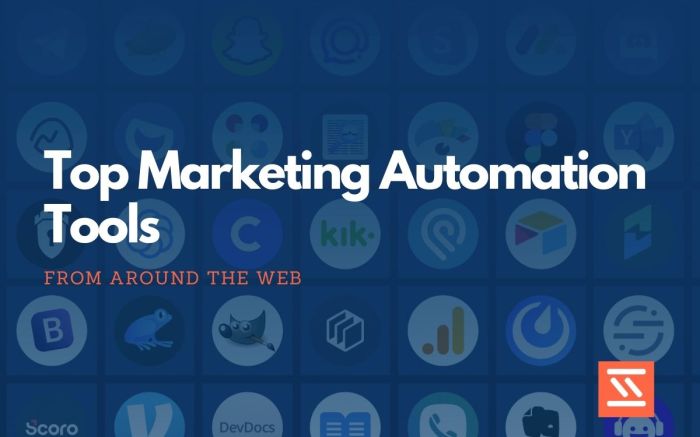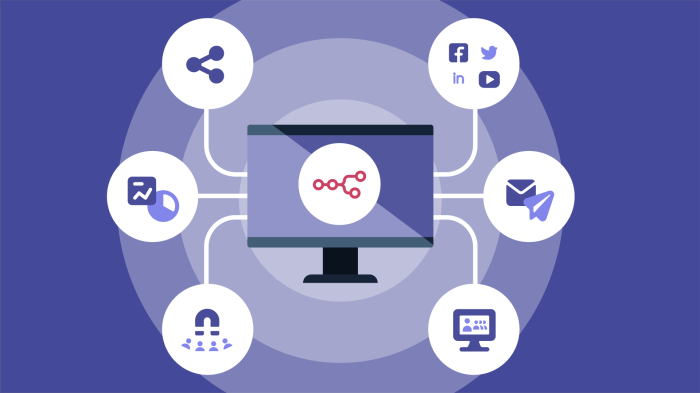Understanding Marketing Automation Tools takes center stage as we dive into a world of efficient business strategies. Get ready to explore the key features, implementation process, use cases, and integration of these powerful tools.
Definition of Marketing Automation Tools

Marketing automation tools are software platforms designed to help businesses automate repetitive marketing tasks and streamline their marketing efforts. These tools allow companies to create, manage, and track marketing campaigns across multiple channels, such as email, social media, and websites, without manual intervention.
Examples of Popular Marketing Automation Tools
- HubSpot: HubSpot is a comprehensive inbound marketing and sales platform that offers a range of automation features, including email marketing, lead nurturing, and analytics.
- Mailchimp: Mailchimp is a popular email marketing platform that also offers automation tools for creating personalized email campaigns, segmenting audiences, and tracking campaign performance.
- Marketo: Marketo is a marketing automation platform that helps businesses engage customers and prospects through personalized marketing campaigns, lead management, and analytics.
Benefits of Using Marketing Automation Tools for Businesses
- Increased efficiency: Marketing automation tools help businesses save time and resources by automating repetitive tasks, such as sending emails, managing social media posts, and tracking campaign performance.
- Improved targeting: These tools enable businesses to create more personalized and targeted marketing campaigns based on customer behavior, preferences, and demographics.
- Enhanced lead generation: Marketing automation tools can help businesses generate and nurture leads more effectively by automating lead scoring, segmentation, and follow-up processes.
- Better insights: By tracking and analyzing campaign performance data, businesses can gain valuable insights into customer behavior, campaign effectiveness, and ROI, allowing them to make data-driven decisions to optimize their marketing strategies.
Key Features of Marketing Automation Tools
Marketing automation tools come with a variety of features that help businesses streamline their marketing processes, save time, and increase efficiency. Let’s explore some key features commonly found in these tools:
Lead Management
Lead management is a crucial feature in marketing automation tools that helps businesses track and manage leads throughout the sales funnel. This feature allows users to capture, nurture, and score leads, ensuring that the right leads are passed on to the sales team at the right time.
Email Marketing Automation
Email marketing automation is another essential feature that allows businesses to create personalized and targeted email campaigns. This feature helps automate email sending, segmentation, and tracking, making it easier to reach the right audience with the right message.
Campaign Management
Campaign management features in marketing automation tools enable users to plan, execute, and track marketing campaigns across multiple channels. This feature provides insights into campaign performance, ROI tracking, and A/B testing capabilities to optimize marketing efforts.
Social Media Integration
Many marketing automation tools offer social media integration features that allow businesses to manage and schedule social media posts, track engagement, and analyze social media performance. This feature helps businesses maintain a consistent presence on social media platforms and engage with their audience effectively.
Analytics and Reporting
Analytics and reporting features in marketing automation tools provide valuable insights into campaign performance, lead generation, and customer behavior. These features help businesses track key metrics, measure the success of their marketing efforts, and make data-driven decisions to improve results.
Workflow Automation
Workflow automation features in marketing automation tools enable businesses to automate repetitive tasks, streamline processes, and improve productivity. This feature allows users to create custom workflows, set triggers and actions, and automate tasks like lead scoring, email sending, and follow-ups.Overall, these key features of marketing automation tools work together to help businesses automate and optimize their marketing efforts, saving time and resources while driving better results.
Implementation of Marketing Automation Tools

Implementing marketing automation tools within a company involves several key steps to ensure successful integration and adoption. Organizations may face various challenges during the implementation process, but with the right strategies and tips, they can overcome these obstacles and maximize the benefits of marketing automation tools.
Steps for Implementing Marketing Automation Tools
- Assess current marketing processes and goals to identify areas where automation can be most beneficial.
- Select the right marketing automation platform that aligns with the company’s needs and budget.
- Create a detailed implementation plan outlining timelines, responsibilities, and key milestones.
- Integrate the marketing automation tool with existing systems, such as CRM software, to ensure seamless data flow.
- Provide comprehensive training for employees to ensure they understand how to use the new tool effectively.
Challenges in Implementing Marketing Automation Tools
- Lack of alignment between marketing and sales teams, leading to miscommunication and inefficiencies.
- Data quality issues that can impact the accuracy and effectiveness of automated campaigns.
- Resistance to change from employees who may be reluctant to adopt new technologies and processes.
- Integration complexities when connecting the marketing automation tool with existing systems and databases.
Tips for Successful Integration and Adoption
- Ensure clear communication and alignment between marketing and sales teams to maximize the benefits of automation.
- Regularly monitor and evaluate data quality to address any issues that may impact the performance of automated campaigns.
- Provide ongoing training and support for employees to encourage adoption and proficiency with the new tool.
- Work closely with the marketing automation vendor to address any integration challenges and ensure a smooth implementation process.
Use Cases of Marketing Automation Tools
Marketing automation tools can be utilized in various scenarios to streamline marketing processes and improve efficiency. Many companies have successfully implemented these tools to enhance lead generation, nurture customer relationships, and boost conversion rates.
Lead Nurturing and Customer Relationship Management
One of the key use cases of marketing automation tools is lead nurturing and customer relationship management. By automating personalized communication with leads and customers based on their behavior and preferences, companies can build stronger relationships and increase customer loyalty.
- Automated email campaigns tailored to specific customer segments
- Lead scoring to prioritize and target high-quality leads
- Automated follow-up sequences to engage leads at the right time
Improved Lead Generation and Conversion Rates, Understanding Marketing Automation Tools
Marketing automation tools play a crucial role in improving lead generation and conversion rates by targeting the right audience with the right message at the right time. Companies can track customer interactions, analyze data, and optimize campaigns for better results.
- Behavior-based triggers to automate responses to customer actions
- Lead segmentation for personalized marketing campaigns
- A/B testing to optimize email content and increase conversions
Integration of Marketing Automation Tools with Other Platforms: Understanding Marketing Automation Tools
Integrating marketing automation tools with other platforms like CRM systems and email marketing platforms is crucial for businesses looking to streamline their marketing efforts and improve overall efficiency. By connecting these tools, companies can create a cohesive marketing strategy that delivers personalized and targeted messages to the right audience at the right time.
Importance of Integrating Marketing Automation Tools
Integrating marketing automation tools with CRM systems allows businesses to track customer interactions, behaviors, and preferences in one centralized location. This seamless integration ensures that marketing campaigns are tailored to the specific needs of each customer, leading to higher engagement and conversion rates.
Guidance on Seamless Integration
When integrating marketing automation tools with other platforms, it is essential to ensure that the data flow between systems is smooth and accurate. This can be achieved by mapping out the data transfer process, setting up automation rules, and regularly monitoring and optimizing the integration to maintain consistency and reliability.
Benefits of Cross-Platform Integration
Cross-platform integration of marketing automation tools enables businesses to create holistic marketing campaigns that span multiple channels and touchpoints. This integration facilitates better tracking of customer interactions, improved lead nurturing, and more effective targeting, ultimately leading to higher ROI and better overall campaign performance.
